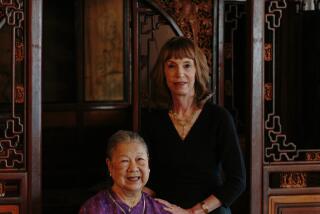NONFICTION - March 28, 1993
SO THE WOMAN WENT HER WAY: A Personal Journey by Lynne Bundesen (Simon and Schuster: $20; 207 pp.). That the New Age movement is growing old has become clear in the paring down of New Age publishing lists, the closing of New Age bookstores and the general sense that its grab-bag of Eastern and Western snippets of ideas has left many of us without roots, without a past we can call our own. It is a sense that is perfectly captured in these pages when journalist Lynne Bundesen attends a Santa Fe dinner: As French phrases are dropped into the conversation and Velveeta cheese is poured over the shrimp, she writes, some people “channel the Magdalene,” while others chant to the sound of “om.” “There is no common issue nor topic in the air,” Bundesen observes, “no thought nor idea nor speculation that can sustain itself long enough to find form.”
Bundesen’s alternative--we need to reclaim the heart of our own Judeo-Christian tradition, the Bible--will obviously raise hackles in our largely secular literary community. But Bible-thumping this is not, for two reasons. First, Bundesen offers the Bible not as the only truth but as her truth: She says she is writing about “the only God that I, as a woman born in the United States between the Depression and the War, could know.” Second, rather than suggesting that we tune in to a preacher and turn off our minds, Bundesen records a singular quest to free herself from sexist Biblical interpretations. Through the stories of Sarah, Rebekah, Rachel and Mary Magdalene, Bundesen finds that “the Bible is a sea of glass in which to view the sacred, female self.”
This is not to say that the glass is always clear. Bundesen claims to have been following the God “who led people out of Egypt” since her childhood, for instance, but this did not prevent her from marrying a man she barely knew, who then beat her and her son. Bundesen is attracted to the Bible, though, not because of its vision of perfection but because of its notions of how to live with imperfection. Poring over the King James version of the Bible, she finds a world where women were “solitary, not heard, upset, in strange, dangerous and confined circumstances, like myself.” And yet, she writes, “in the Bible women acted, not just in subservience or disobedience to men but independently of men.” As she reads from Samuel, “So the woman went her way, and did eat, and her countenance was no more sad.”
More to Read
Sign up for our Book Club newsletter
Get the latest news, events and more from the Los Angeles Times Book Club, and help us get L.A. reading and talking.
You may occasionally receive promotional content from the Los Angeles Times.







